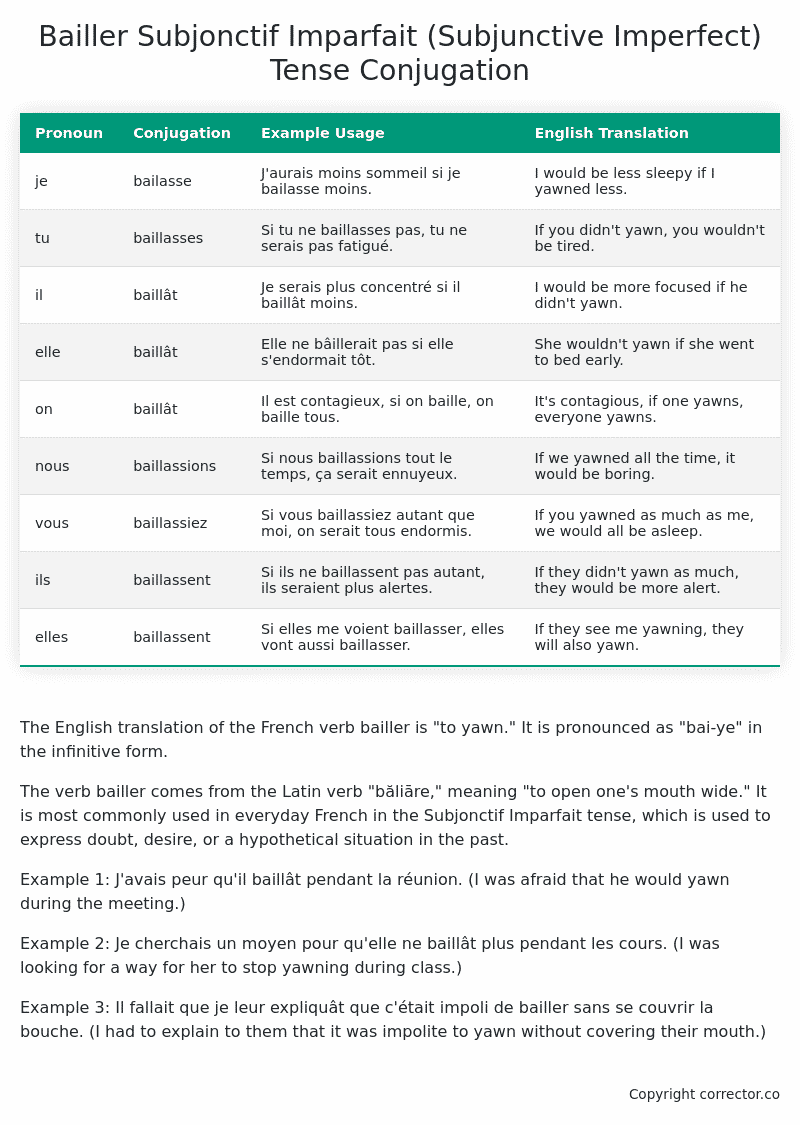Subjonctif Imparfait (Subjunctive Imperfect) Tense Conjugation of the French Verb bailler
Introduction to the verb bailler
The English translation of the French verb bailler is “to yawn.” It is pronounced as “bai-ye” in the infinitive form.
The verb bailler comes from the Latin verb “băliāre,” meaning “to open one’s mouth wide.” It is most commonly used in everyday French in the Subjonctif Imparfait tense, which is used to express doubt, desire, or a hypothetical situation in the past.
Example 1:
J’avais peur qu’il baillât pendant la réunion.
(I was afraid that he would yawn during the meeting.)
Example 2:
Je cherchais un moyen pour qu’elle ne baillât plus pendant les cours.
(I was looking for a way for her to stop yawning during class.)
Example 3:
Il fallait que je leur expliquât que c’était impoli de bailler sans se couvrir la bouche.
(I had to explain to them that it was impolite to yawn without covering their mouth.)
Table of the Subjonctif Imparfait (Subjunctive Imperfect) Tense Conjugation of bailler
| Pronoun | Conjugation | Example Usage | English Translation |
|---|---|---|---|
| je | bailasse | J’aurais moins sommeil si je bailasse moins. | I would be less sleepy if I yawned less. |
| tu | baillasses | Si tu ne baillasses pas, tu ne serais pas fatigué. | If you didn’t yawn, you wouldn’t be tired. |
| il | baillât | Je serais plus concentré si il baillât moins. | I would be more focused if he didn’t yawn. |
| elle | baillât | Elle ne bâillerait pas si elle s’endormait tôt. | She wouldn’t yawn if she went to bed early. |
| on | baillât | Il est contagieux, si on baille, on baille tous. | It’s contagious, if one yawns, everyone yawns. |
| nous | baillassions | Si nous baillassions tout le temps, ça serait ennuyeux. | If we yawned all the time, it would be boring. |
| vous | baillassiez | Si vous baillassiez autant que moi, on serait tous endormis. | If you yawned as much as me, we would all be asleep. |
| ils | baillassent | Si ils ne baillassent pas autant, ils seraient plus alertes. | If they didn’t yawn as much, they would be more alert. |
| elles | baillassent | Si elles me voient baillasser, elles vont aussi baillasser. | If they see me yawning, they will also yawn. |
Other Conjugations for Bailler.
Le Present (Present Tense) Conjugation of the French Verb bailler
Imparfait (Imperfect) Tense Conjugation of the French Verb bailler
Passé Simple (Simple Past) Tense Conjugation of the French Verb bailler
Passé Composé (Present Perfect) Tense Conjugation of the French Verb bailler
Futur Simple (Simple Future) Tense Conjugation of the French Verb bailler
Futur Proche (Near Future) Tense Conjugation of the French Verb bailler
Plus-que-parfait (Pluperfect) Tense Conjugation of the French Verb bailler
Passé Antérieur (Past Anterior) Tense Conjugation of the French Verb bailler
Futur Antérieur (Future Anterior) Tense Conjugation of the French Verb bailler
Subjonctif Présent (Subjunctive Present) Tense Conjugation of the French Verb bailler
Subjonctif Passé (Subjunctive Past) Tense Conjugation of the French Verb bailler
Subjonctif Imparfait (Subjunctive Imperfect) Tense Conjugation of the French Verb bailler (this article)
Subjonctif Plus-que-parfait (Subjunctive Pluperfect) Tense Conjugation of the French Verb bailler
Conditionnel Présent (Conditional Present) Tense Conjugation of the French Verb bailler
Conditionnel Passé (Conditional Past) Tense Conjugation of the French Verb bailler
L’impératif Présent (Imperative Present) Tense Conjugation of the French Verb bailler
L’infinitif Présent (Infinitive Present) Tense Conjugation of the French Verb bailler
Struggling with French verbs or the language in general? Why not use our free French Grammar Checker – no registration required!
Get a FREE Download Study Sheet of this Conjugation 🔥
Simply right click the image below, click “save image” and get your free reference for the bailler Subjonctif Imparfait tense conjugation!

Bailler – About the French Subjonctif Imparfait (Subjunctive Imperfect) Tense
Formation
Common Everyday Usage Patterns
Interactions with Other Tenses
Subjonctif Présent
Indicatif Passé Composé
Conditional
Conditional Perfect
Summary
I hope you enjoyed this article on the verb bailler. Still in a learning mood? Check out another TOTALLY random French verb conjugation!


